Extremely Loud and Incredibly Close
 for emotional thematic material, some disturbing images, and language.
for emotional thematic material, some disturbing images, and language.
Reviewed by: Scott Brennan
CONTRIBUTOR
| Moral Rating: | Better than Average |
| Moviemaking Quality: |
|
| Primary Audience: | Adults Teens |
| Genre: | Drama Adaptation |
| Length: | 2 hr. 9 min. |
| Year of Release: | 2011 |
| USA Release: |
December 25, 2011 (select cities) January 20, 2012 (wide—2,500+ theaters) DVD: March 27, 2012 |
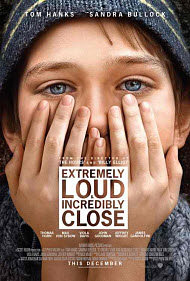

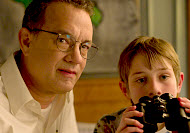

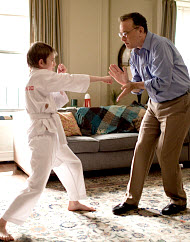
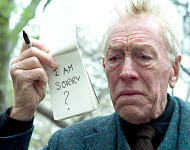

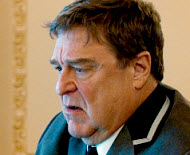

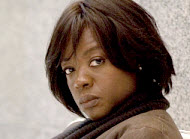
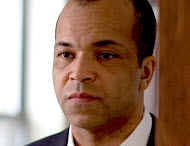
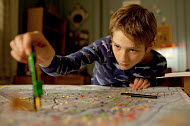
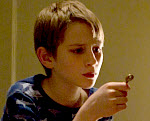
tragic events of September 11, 2001 at the World Trade Center, New York City
exceptional child
father son relationship
pacifist, pacifism
What is the Biblical perspective on war? Answer
pain of bereavement
grief
death of father
loss of husband
funerals in the Bible
Why does God allow innocent people to suffer? Answer
What about the issue of suffering? Doesn’t this prove that there is no God and that we are on our own? Answer
Does God feel our pain? Answer
ORIGIN OF BAD—How did bad things come about? Answer
Did God make the world the way it is now? What kind of world would you create? Answer
solace of love
grandson and grandparents relationship
“healing power of self-discovery”
single mother
mother son relationship
keys in the Bible
| Featuring |
|---|
|
Tom Hanks … Thomas Schell Sandra Bullock … Linda Schell John Goodman … Stan the Doorman Max von Sydow … The Renter Viola Davis … Abby Black Jeffrey Wright … William Black See all » |
| Director |
|
Stephen Daldry |
| Producer |
|
Paramount Pictures Scott Rudin Productions Warner Bros. Pictures Celia D. Costas … executive producer Scott Rudin … producer Nora Skinner … executive producer |
| Distributor |
|
|
Everyone has a story. That’s just one of the themes that emanated from this thoughtful screenplay in nearly every frame of this film. If ever there was a trailer for a film that tantalized a potential audience without revealing its innermost secrets, then this one surpassed it—and set a new bar. If you think this movie is just another variation of what has now become the 911 genre, think again. If you want to feel deeply, and be moved to action, then you won’t want to miss this film. This one’s a keeper for adults and mature teens.
Tom Hanks and Sandra Bullock work their movie magic in the way we audiences have come to expect them to, with characters that we know, that we’ve met--real people in our everyday lives, not some Hollywood elites that none of us can relate to. But they are only the buttresses and the bookends as parents for the true marvel in this movie, their son, Oskar Schell played by Thomas Horn. This kid is amazing. I certainly hope it won’t be the last time we see him on the big screen. His recent television interview snippets reveal a savvy smart boy in real life that matches his character in the movie. He’s not sure he’ll do another film. But even if he doesn’t, his work is done here. The impression he leaves with the audience is indelible, of that I am most certain. The reaction to his performance was palpable in the theater by the end of the film. Some of that credit must also go to supporting veteran actor, Max von Sydow, who used only his facial expressions, body language and a notepad to express himself as the silent “renter” in the film. There was an almost deafening silence in the room during the final credits, yet it was filled with electricity; it made you feel empowered and grateful to be alive in that moment.
The early plot was slow and methodical, and somewhat predictable when establishing the setting and characters--perhaps a little too slow during the first third of the film. But the second and third acts took me to places I did not expect to go--places in the heart. One of the first rules for writing a great story taught in a creative writing class is “show me, don’t tell me.” What Eric Roth (veteran screen playwright—“Forrest Gump”) and director Stephen Daldry did with this amazing film was take the viewers across a tightrope of both. Using 1st person narrative voice-over they used Oskar to “tell me” what was happening, in real time and in retrospect. Yet, through a variety of unique methods, they “showed me” many other things that were “too deep for tears” (to borrow a phrase from a William Wordsworth poem).
For example, the “flashback device”—almost a staple for films in the 21st century—was intricately and cleverly used during this film in ways that were essential to the plot and which added to the depth of emotion experienced all the way through. Concerning Oskar, they used flashbacks and some of his personal grieving moments to show the audience some of the secret things the he was hiding (but not all of them) before he necessarily revealed them to others in the story. Of course, this allowed us to feel connected to him deeply before he disclosed any of these truths in real time—some that he didn’t even know that he knew, until he spoke them out loud. It was a very well-edited film with a superb musical score, (Alexandre Desplat)—compelling and moving, but not forced.
Spiritual lessons and possible objectionable content
The Spiritual Lessons that can be derived from a movie like this are innumerable. I wouldn’t be surprised if clips from this film would someday be used in sermons or at seminars in churches around the world to portray a variety of ideas, emotions and truths about God’s Word or human nature in general— if only to demonstrate the will of a child fighting against it. (Acts 9:5) Oskar had trouble viewing the miracles as they happened.
The script contains a positive focus on the bond of family, the love of a child for their parents and parents for their child. There are simple vignettes and random acts of kindness throughout the film that add layers of rich texture to the film. They each contribute to the ever-deepening waves of emotion springing forth from that common well of humanity that we all experience. There is a powerful emphasis on forgiveness, on truth-telling and just plain perseverance to help us all overcome the tragedies that befall humanity. (Rule 7: Nothing gets in the way of the search.) The boy even begins to count his own lies at one point as he pursues his personal goal of unlocking the secret to the mysterious key he believed his dad had left behind. It was a clear demonstration of conscience (Acts 2:37) and preparation for more revelation later in the film.
Conversely, the sting of death, especially under the circumstances of that terrible day, is not sugar-coated, but exposed openly. “There is no reason,” Bullock bellows to her son, “There is no explanation as to why someone would do this terrible thing. I can’t make the impossible possible!” For the believer, of course there is. And the Word says that “With God, all things are possible.” We know that all mankind has fallen under the curse of sin and death (Romans 3), and its powers and the devices of the enemy are not limited to Muslim jihadists flying planes into the World Trade Center. So we have a reason for the hope that lies within us (1 Peter 3:15).
But for Oskar, there was only science and reason to battle the questions and doubts that would be common for anyone in his shoes. For him, only the disturbing images remained, of how he imagined his father jumping or of all the people he met on his journey including a drag queen that made him question reality, or the ladies that laid hands on him and prayed for him which made him only doubt more—why they didn’t pray for his dad on that terrible day? (My parenthetical comment when secular writers insert this “straw-man argument” is always the same: maybe they did pray, and that’s why the outcome wasn’t worse.)
This film is rich on so many levels, and yet the “Is it half empty or half full?” question is relevant here. Although “beauty is in the eye of the beholder” is an overused cliché, its truth is not diminished. Comments following the review I did on “The Iron Lady” last week reminded me about how differently we can each see the world. While I did see the negative light that the film may have tried to cast upon Margaret Thatcher, I couldn’t help but be moved to see only her strength of character instead. What others may view as a negative film, one to be panned even, I graded as above average in morality and to be praised, mostly because of how much I continue to admire the former prime minister and how I saw her portrayed.
In this film, getting beyond the one OMG or the half dozen or so clever cuss words (geek-style vulgarities like “succotash-my-Balzac” and “dip-shiitake”) spoken by Horn, and the emotionally charged content of 911 (some bodies falling from WTC in stills) revisited is easy when the payback is as profound as it is in this movie. That said, proceed with caution—especially with teens—but it’s the application below that I believe makes this movie so compelling.
“Extremely Loud and Incredibly Close” is a poignant film, sort of a cross between “August Rush” (2007) and “Pay it Forward” (2000) only without the emotional manipulation of either (although I liked them both). It takes an event that is a part of human history, nearly embedded into the DNA of our collective consciousness and uses it as a springboard to tell a gripping story. For the Christian, I believe it should beckon us to tell our own “God Story”, which, despite what evil may have swooped into our lives unexpectedly, manifestly demonstrates the mercy of a loving God and Savior coming at us in every direction. While Oskar yelled out of frustration in one particular scene, “I don’t believe in miracles,” I believe it becomes our responsibility to yell out, “But I do! Will you listen to my story?” The most powerful line in the movie for me was “Do you forgive me…for not telling anyone?” I don’t ever want to be asking that question of the Lord, when it comes to sharing what He’s done for me in my life.
Violence: Moderate / Profanity: Minor / Sex/Nudity: None
See list of Relevant Issues—questions-and-answers.


During the beginning portion of this film, I wondered whether I’d made a poor choice (like the negative commenter to whom I referred above). However, I stayed, and the last third of the film was what made it especially memorable, poignant, and well worth watching through the dark and sad parts. By the end of the movie, I felt I had made a good choice in choosing to see it. So, if you decide to see this movie, please stay to see it through to its end.
Moral rating: Better than Average / Moviemaking quality: 3½
Moral rating: Better than Average / Moviemaking quality: 5
Moral rating: Better than Average / Moviemaking quality: 5
Moral rating: Good / Moviemaking quality: 5
Moral rating: Good / Moviemaking quality: 4½
Moral rating: Good / Moviemaking quality: 5
Moral rating: Average / Moviemaking quality: 3
Moral rating: Excellent! / Moviemaking quality: 5
Moral rating: Extremely Offensive / Moviemaking quality: 1½
PLEASE share your observations and insights to be posted here.

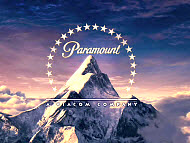
My Ratings: Moral rating: Good / Moviemaking quality: 4